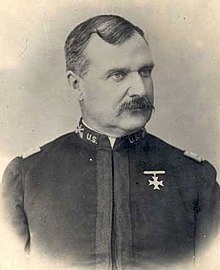Homer W. Wheeler
Homer Webster Wheeler (born May 13, 1848 in Berkshire , Franklin County , Vermont , † April 11, 1930 in Los Angeles , Los Angeles County , California ) was a colonel in the US Army , who was in command of the military district of Hawaii ( US Army District of Hawaii ) was.
Life
Wheeler, son of Augustus C. Wheeler and his wife Lucretia S. Babcock Wheeler, attended a business school in New York City before moving to Kansa in 1868 . In the following years he made various trips through the Great Plains with well-known scouts such as Will Comstock, William "Buffalo Bill" Frederick Cody and James Butler "Wild Bill" Hickok . He later took part as a civilian volunteer from Fort Wallace in various exploration expeditions of the US Army . In 1875 he took part in the fighting on Sappa Creek during the Indian Wars and was promoted to lieutenant because of his bravery . In the aftermath of the Indian Wars, it found uses in various units in Colorado , Nebraska, and Wyoming .
During the Spanish-American War was Wheeler on Puerto Rico stationed, and later as a member of the 11th Cavalry Regiment, founded in 1901 ( 11th Cavalry Regiment ) from 1902 to 1904 to the Philippines and then from 1906 to 1909 in Cuba . 1910 Wheeler was a lieutenant colonel successor to Colonel Walter S. Schuyler as commander of the Military District of Hawaii ( US Army District of Hawaii ) . As such, he was promoted to colonel himself in March 1911 and retired from active military service in September 1911, whereupon Brigadier General Montgomery M. Macomb succeeded him as commander of the US Army District of Hawaii. After retiring, he settled in Los Angeles and wrote The Frontier Trail (1923) and Buffalo Days (1925) autobiographical books about his experiences in the 1870s.
Wheeler died in April 1930 and was buried in Evergreen Cemetery in Hillside , New Jersey .
Publications
- The Frontier Trail , 1923
- Buffalo Days , 1925
Web link
- Homer W. Wheeler in the database of Find a Grave (English)
| personal data | |
|---|---|
| SURNAME | Wheeler, Homer W. |
| ALTERNATIVE NAMES | Wheeler, Homer Webster (full name) |
| BRIEF DESCRIPTION | American officer, Army Colonel and author |
| DATE OF BIRTH | May 13, 1848 |
| PLACE OF BIRTH | Berkshire , Franklin County , Vermont |
| DATE OF DEATH | April 11, 1930 |
| Place of death | Los Angeles , Los Angeles County , California |
